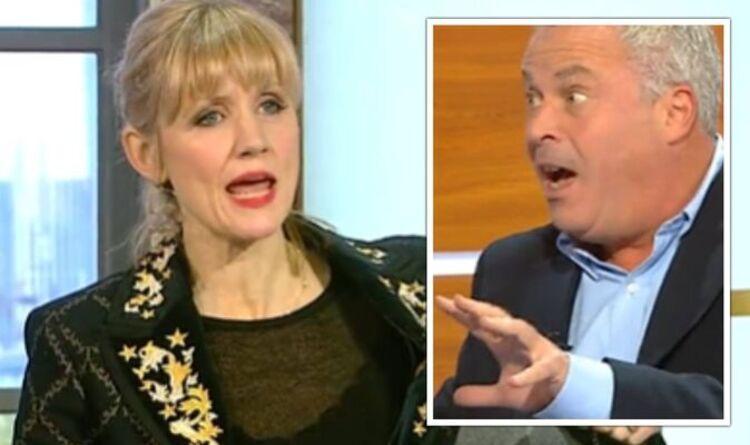Tessa Dunlop and James Max Clash Over Ukraine No-Fly Zone and Boris Johnson's Role in Crisis

Introduction: Broadcaster Tessa Dunlop and James Max recently engaged in a heated debate over the ongoing conflict in Ukraine, with Dunlop advocating for a no-fly zone and questioning Boris Johnson’s leadership in managing the crisis. Max countered, emphasizing the importance of unity in the West, arguing that now is not the time for leadership changes. Their exchange underscored significant divisions on how the UK should approach its role in the Ukraine-Russia conflict and revealed broader concerns about British political influence and historical ties to Russia.
Boris Johnson's Six-Point Plan: In response to the escalating conflict, Prime Minister Boris Johnson unveiled a six-point plan aimed at supporting Ukraine and countering Russian aggression. The plan prioritizes international collaboration, bolstering Ukraine’s defenses, increasing sanctions against Russia, refusing to accept Russian aggression as the norm, encouraging diplomatic efforts, and fostering stronger European alliances. The plan was intended to present a united front, but it has drawn criticism from various quarters, including Dunlop, who questioned whether Johnson is the appropriate leader to guide the UK through this crisis.
Tessa Dunlop’s Concerns on Johnson's Credibility: Dunlop expressed doubts about Johnson’s ability to lead in this international emergency, citing past controversies and perceived failures to address UK-Russia relations transparently. She recalled Johnson’s reluctance to release the “Russia report” following accusations of Russian interference in UK political matters, including the Brexit referendum. According to Dunlop, these actions and Johnson's past affiliations with Russia-linked interests have compromised his credibility. She argued that these unresolved issues have now created obstacles to the UK’s ability to lead Europe effectively in addressing Russian aggression.
The Debate on a No-Fly Zone: The tension between Dunlop and Max reached its peak during their exchange on whether a no-fly zone over Ukraine would be a prudent step. Dunlop believes that a no-fly zone could help protect Ukrainian civilians and ease the humanitarian crisis in besieged areas like Mariupol. She referenced her experience studying Romanian warfare to support her viewpoint, arguing that her knowledge of Eastern European conflict gave her insight into the region’s complexities. Dunlop depicted the dire conditions faced by Ukrainian civilians, emphasizing the urgency of humanitarian intervention.
Max, however, countered that imposing a no-fly zone could escalate the conflict into a broader war between Russia and NATO, with the potential to trigger World War III. He argued that such an action would inevitably involve NATO forces directly engaging with Russian military aircraft, pushing the UK and its allies into active combat with Russia. For Max, the risk of escalation outweighs the potential benefits of a no-fly zone, especially considering the precarious global political landscape.
James Max’s Defense of Johnson’s Leadership Amid Crisis: Max conceded that Johnson’s leadership has been marred by mistakes and controversies, but he argued that this was not the time to replace the Prime Minister. He pointed out that even Labour leader Keir Starmer had called for stability within the UK government during this international crisis. Max also criticized the leadership of the U.S., calling President Joe Biden’s response to Russia "weak" and inconsistent, which, in his view, further justified the need for a united Western stance against Russia, with Johnson maintaining his role for the sake of continuity.
While acknowledging Johnson’s flawed track record, Max maintained that the Prime Minister’s recent actions in response to Ukraine were at least a start and represented a step towards mobilizing Western support against Russian aggression. For Max, the immediate focus should be on solidifying alliances rather than exacerbating political division in the UK.
A Closer Look at UK’s Military Heritage and Past Decisions: Dunlop criticized the UK’s handling of its military heritage, suggesting that Britain had “squandered” its position as a global power by failing to act decisively in Ukraine. She argued that the UK could have played a more prominent role, perhaps by taking earlier actions to support Ukraine, thus capitalizing on its historical reputation and influence.
Max responded by reiterating the necessity of measured action, noting that rash decisions could undermine the UK’s position and risk unnecessary conflict escalation. He expressed the view that while historical ties are significant, modern geopolitics necessitate calculated responses, particularly when engaging with a nuclear-armed state like Russia.
Conclusion: The exchange between Dunlop and Max reflects the UK’s divided opinions on how to respond to the Ukraine-Russia crisis and the challenges of balancing humanitarian concerns with the risks of escalation. While Dunlop advocates for a bold stance, including a no-fly zone, Max and others warn of the potential for catastrophic consequences. Johnson’s leadership remains contentious, with critics questioning his past decisions and allies arguing for stability. This debate highlights the difficulties facing world leaders as they navigate a complex geopolitical landscape, with the potential for far-reaching consequences in Eastern Europe and beyond.
3d love stickers
wine stickers for bottles
merry christmas pictures
happy new year best design
Cricut Maker thank you card designs
- Art
- Causes
- Crafts
- Dance
- Drinks
- Film
- Fitness
- Food
- Spellen
- Gardening
- Health
- Home
- Literature
- Music
- Networking
- Other
- Party
- Religion
- Shopping
- Sports
- Theater
- Wellness
- IT, Cloud, Software and Technology


